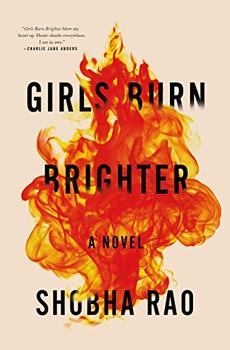Summary | Excerpt | Reading Guide | Discuss | Reviews | Beyond the Book | Readalikes | Genres & Themes | Author Bio

With her mother dead, Poornima slowed her charkha; she put it away sometimes even in the middle of the day, and she would stare at the walls of the hut and think, I'll forget her voice. Maybe that's what that old nun had meant, that you forget a sound you don't hear every day. I don't think I will now, but I will. And then I'll have lost everything. Once she thought this, she knew she had to remember more than a voice, she had to remember a moment, and this is the one that came to her: In the course of her mother's illness, she had been well enough one morning to comb Poornima's hair. It had been bright and sunny outside and the brush strokes had been so gentle and light that Poornima had felt as if the person holding the comb were not a person at all but a small bird perched on its handle. After three or four strokes her mother had stopped suddenly. She'd rested her hand on her daughter's head for a moment, and Poornima turned to find her mother's eyes filled with tears. Her mother had looked back at her and with a sadness that had seemed old and endless, she'd said, "Poornima, I'm too tired. I'm so tired."
How long after that had she died?
Three, maybe four months later, Poornima guessed. They'd woken up one morning and her eyes had been open and empty and lifeless. Poornima hadn't been able to cry, though. Not when she'd helped bathe and dress her mother's body. Not when her father and brothers had carried her, jasmine-laden, through the streets of the village. Not even as the funeral pyre had burned down to a cold ash. Nor when she'd strung the last chrysanthemum on the garland that hung from the framed portrait of her mother. Only later, when she'd walked out into the season's first cool autumn morning, had she cried. Or tried to cry. The tears, she recalled, had been paltry. At the time, she'd felt like a bad daughter for not crying, for not weeping, but no matter how sad she'd felt, how profound her sorrow, she'd only managed to squeeze out one or two tears. A vague reddening of the eyes. "Amma," she'd said, looking up at the sky, "forgive me. It's not that I don't love you. Or miss you. I don't understand; everyone else is crying. Buckets. But tears aren't the only measure, are they?"
Still, what she had imagined came true: as the months wore on she forgot her mother's voice. But what she did remember, the only thing that truly stayed with her, was that for a short time—while combing her hair—her mother had rested her hand on her. It was the slightest of gestures, and yet Poornima felt it, always: the weight of her mother's hand. A weight so delicate and fine, it was like the spatter of raindrops after a hot summer's day. A weight so small and tired, but with strength enough to muscle through her veins like blood.
In the end, she decided, it was the most beautiful weight.
* * *
Once a month, Poornima went to the temple on Indravalli Konda to offer prayers for her mother. She stood in the incense-choked anteroom and watched the priest, hoping the gods would speak to her, would tell her amma was with them, though what she truly yearned to reach was the deepa, more a small lantern, that was perched at the very summit of the mountain. Sometimes she'd stand outside their hut and look up, on a Sunday or a festival day, and it would glow, distant and yellow and blinking, like a star. "Who lights it?" she once asked her father.
"Lights what?"
"The deepa, on the summit."
Her father, sitting outside the hut after dinner, his arms fatigued, his body hunched, glanced at Indravalli Konda and said, "Some priest, probably. Some kid."
Poornima was quiet for a moment, and then she said, "I think Amma lights it."
Her father looked at her. His look was dark, ravaged, as if he'd just walked out of a burning building. Then he asked for his tea. When she handed it to him, he said, "Another ten months."
Excerpted from Girls Burn Brighter by Shobha Rao. Copyright © 2018 by Shobha Rao. Excerpted by permission of Flatiron Books. All rights reserved. No part of this excerpt may be reproduced or reprinted without permission in writing from the publisher.




Happiness makes up in height for what it lacks in length.
Click Here to find out who said this, as well as discovering other famous literary quotes!
Your guide toexceptional books
BookBrowse seeks out and recommends the best in contemporary fiction and nonfiction—books that not only engage and entertain but also deepen our understanding of ourselves and the world around us.